Africa-Press – Liberia. The United Nations Population Fund (UNFPA), in collaboration with the Ministry of Youth and Sports and the Liberia Institute for Statistics and Geo-Information Services (LISGIS), on Wednesday, July 2, 2025, launched the 2025 State of the World Population Report in Monrovia.
This year’s report, titled “The Real Fertility Crisis: The Pursuit of Reproductive Agency in a Changing World”, was officially released globally on June 10, 2025, in Nairobi, Kenya, by Dr. Natalia Kanem, Executive Director of UNFPA. It estimates the global population at approximately 8.2 billion—representing a 0.85% increase from the previous year.
The national launch event, held at Monrovia City Hall, brought together high-level government officials, representatives from civil society, development partners, members of the diplomatic corps, and youth leaders for a panel discussion on the implications of the report for Liberia.
The report reveals a concerning global trend: millions of people are unable to realize their reproductive goals—whether that means having more children, fewer, or none at all.
“The most consequential reproductive decision a person can make—when, whether, and with whom to have a child—is increasingly undermined,” the report states. “The inability to achieve desired fertility is the real crisis—not overpopulation or underpopulation.”
It emphasizes that reproductive agency extends beyond access to services or freedom from coercion. It requires broader conditions—gender equality, economic security, access to quality healthcare, and hope for the future—that empower individuals to make informed reproductive choices.
This year’s findings are based on a survey of over 400,000 people across 14 countries, highlighting key factors affecting fertility choices: economic instability, housing challenges, climate change, conflict, pandemics, and difficulties in forming partnerships.
UNFPA calls on governments and stakeholders to create conditions where people who want to experience parenthood can do so with dignity, safety, and support—where their choices are respected, and future generations can thrive.
‘A Mirror to the World’
Christine Umutoni, United Nations Resident Coordinator in Liberia, described the report as “more than statistics”, calling it a mirror that allows nations to reflect on progress and challenges.
Despite Liberia’s commitment to the Sustainable Development Goals and the Arrest Agenda for Inclusive Development (AAID), she noted that many Liberians—particularly women and girls—still lack access to essential reproductive health services.
“Gender inequality, poverty, and climate change continue to deepen vulnerabilities—especially for women and young people,” Madam Umutoni said.
She called for a shift from fear-based narratives about population growth or decline to human rights-based approaches centered on choice, dignity, and agency.
“The data call on us to ensure universal access to reproductive health, invest in youth, and empower women and girls to make informed decisions about their lives and futures,” she added.
She also commended the Government of Liberia and development partners for advancing equitable and inclusive population policies.
“As Resident Coordinator, I reaffirm the UN’s commitment to supporting the Government and people of Liberia in advancing rights-based population policies and sustainable development,” Madam Umutoni concluded.
Strengthening National Capacity
Richard Fátorma Ngafuan, Director General of LISGIS, stressed the need for stronger institutional support to address Liberia’s evolving demographic challenges.
“We cannot build tomorrow’s Liberia with yesterday’s tools,” Ngafuan said, acknowledging UNFPA’s support in developing a National Population Policy and a renewed National Strategy for the Development of Statistics (NSDS) to guide evidence-based policymaking.
Investing in Liberia’s Youth
Jeror Cole Bangalu, Minister of Youth and Sports, noted that 75% of Liberia’s population is under the age of 35—a demographic that presents both opportunities and challenges.
He emphasized that investing in young people is crucial to unlocking the country’s demographic dividend.
“At the Ministry of Youth and Sports, our mandate is to advance youth development through empowerment, technical and vocational training, digital literacy, entrepreneurship, and youth participation in governance and peacebuilding,” Minister Bangalu said.
He praised the Ministry’s partnership with UNFPA and the broader UN system, highlighting ongoing efforts to support youth affected by drug and substance abuse, and initiatives such as the National Youth Policy and the National Action Plan for Youth, Peace, and Security.
For More News And Analysis About Liberia Follow Africa-Press






